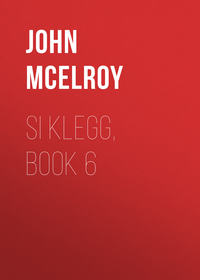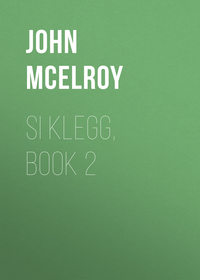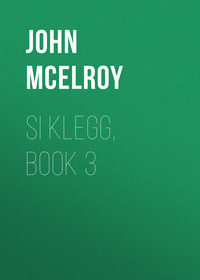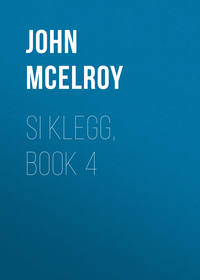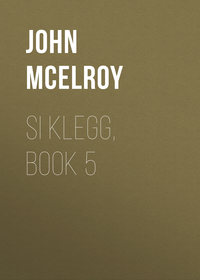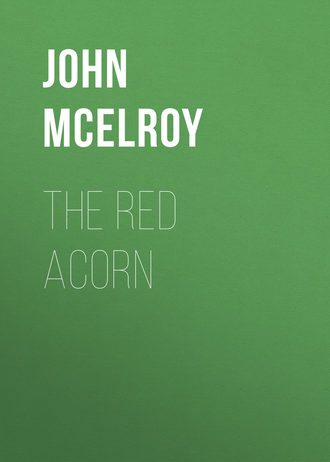 полная версия
полная версияThe Red Acorn
“It’s done that already, several times, or rather its contents have. You know what the Bible says, ‘Biteth liek a serpent and stingeth like an adder?’ Ah, here it is. But gloomy forebodings seize me: it is suspiciously light. Paradoxically, its lightness induces gravity in me. But that pun is entirely too fine-drawn for camp atmosphere.”
He shook the canteen near his ear. “Alas! no gurgle responds to my fond caresses—
Canteen, Mavourneen, O, why art thou silent, Thou voice of my heart? It is—woe is me—it is empty.”“Of course it is—you were the last one at it.”
“I hurl that foul imputation back into thy teeth base knave. Thou thyself art a very daughter of a horse-leech with a canteen of whisky.”
Abe looked at him inquiringly. “You must’ve found some, some place,” he said, “or you wouldn’t be so awful glib. It’s taken ‘bout half-a-pint to loosen your tongue so that it’d run this way. I know you.”
“No, I’ve not found a spoonful. The eloquence of thirst is the only inspiration I have at present. I fain would stay its cravings by quaffing a beaker of mountain-distilled hair-curler. Mayhap this humble receptacle contains yet a few drops which escaped thy ravenous thirst.”
Kent turned the canteen upside down and placed its mouth upon his tongue. “No,” he said, with deep dejection, “all that delicious fluid of yesterday is now like the Father of his Country.”
“Eh?” asked Abe, puzzled.
“Because it is no more—it is no more. It belongs to the unreturning past.”
“I say,” he continued after a moment’s pause, “let’s go out and hunt for some, there must be plenty in this neighborhood. Nature never makes a want without providing something to supply it. Therefore, judging from my thirst, this country ought to be full of distilleries.”
They buckled on their belts, picked up their guns and started out, directing their steps to the front.
In spite of the sunshine the walk through the battle-field was depressing. A chafing wind fretted through the naked limbs of the oaks and chestnuts, and drew moans from the pines and the hemlocks. The brown, dead leaves rustled into little tawny hillocks, behind protecting logs and rocks. Frequently those took on the shape of long, narrow mounds as if they covered the graves of some ill-fated being, who like themselves, had fallen to the earth to rot in dull obscurity. The clear little streams that in Summer-time murmured musically down the slopes, under canopies of nodding roses and fragrant sweet-brier, were now turbid torrents, brawling like churls drunken with much wine, and tearing out with savage wantonness their banks, matted with the roots of the blue violets, and the white-flowered puccoon.
Scattered over the mountain-side were fatigue-parties engaged in hunting up the dead, and burying them in shallow graves, hastily dug in clay so red that it seemed as if saturated with the blood shed the day before. The buriers thrust their hands into the pockets of the dead with the flinching, nauseated air of men touching filth, and took from the garments seeping with water and blood, watches, letters, ambrotypes, money and trinkets, some of which they studied to gain a clue to the dead man’s identity, some retained as souvenirs, but threw the most back into the grave with an air of loathing. The faces of the dead with their staring eyes and open mouths and long, lank hair, cloyed with the sand and mud thrown up by the beating rain, looked indescribably repulsive.
The buriers found it better to begin their work by covering the features with a cap or a broad-brimmed hat. It was difficult for the coarsest of them to fling a spadeful of dank clay directly upon the wide-open eyes and seemingly-speaking mouth.
“Those fellows’ souls,” said Kent, regarding the corpses, “seem to have left their earthly houses in such haste that they forgot to close the doors and windows after them. Somewhere I have read of a superstition that bodily tenements left in this way were liable to be entered and occupied by evil spirits, and from this rose the custom of piously closing the eyes and mouths of deceased friends.”
“No worse spirit’s likely to get into them than was shot out of ‘em,” growled Abe. “A Rebel with a gun is as bad an evil spirit as I ever expect to meet. But let’s go on. It’s another kind of an evil spirit that we are interested in just now—one that’ll enter into and occupy our empty canteen.”
“You’re right. It’s the enemy that my friend Shakspere says we ‘put into our mouths to steal away our brains.’ By the way, what a weary hunt he must have in your cranium for a load worth stealing.”
“Thee goes that clack-mill again. Great Caesar! if the boys only had legs as active as your tongue what a racer the regiment would be! Cavalry’d be nowhere.”
Toward the foot of the mountain their path led them across a noisy, swollen little creek, whose overflowing waters were dyed deeply red and yellow by the load of hill clay they were carrying away in their headlong haste. A little to the left lay a corpse of more striking appearance than any they had yet seen. It was that of a tall, slender, gracefully formed young man, clad in an officer’s uniform of rich gray cloth, lavishly ornamented with gilt buttons and gold lace. The features were strong, but delicately cut, and the dark skin smooth and fine-textured. One shapely hand still clasped the hilt of a richly ornamented sword, with which he had evidently been directing his men, and his staring gray eyes seemed yet filled with the anger of battle. A bullet had reached him as he stood upon a little knoll, striving to stay the headlong flight. Falling backward his head touched the edge of the swift running water, which was now filling his long, black locks with slimy sediment.
“The ounce o’ lead that done that piece o’ work,” said Abe, “was better’n a horseload o’ gold. A few more used with as good judgement would bring the rebellion to an end in short meter.”
“Yes,” answered Kent, “he’s one of the Chivalry; one of the main props; one of the fellows who are trying to bring about Secession in the hopes of being Dukes, or Marquises, or Earls—High Keepers of His Majesty Jeff. Davis’s China Spittoons, or Grand Custodians of the Prince of South Carolina’s Plug Tobacco, when the Southern Confederacy gains its independence.”
“Well,” said Abe, raising the Rebel’s hat on the point of his bayonet, and laying it across the corpse’s face, “he’s changed bosses much sooner than he expected. Jeff. Davis’s blood-relation, who presides over the Sulphur Confederacy, will put on his shoulder-straps with a branding-iron, and serve up his rations for him red-hot. I only wish he had more going along with him to keep him company.”
“Save your feelings against the Secessionists for expression with your gun in the next fight, and come along. I’m getting thirstier every minute.”
They walked on rapidly for a couple or three hours, without finding much encouragement in their search. The rugged mountain sides were but thinly peopled, and the few poor cabins they saw in the distance they decided were not promising enough of results to justify clambering up to where they were perched. At last, almost wearied out, they halted for a little while to rest and scan the interminable waves of summits that stretched out before them.
“Ah,” said Kent, rising suddenly, “let’s go on. Hope dawns at last. I smell apples. That’s a perfume my nose never mistakes. We’re near an orchard. Where there’s an orchard there’s likely to be a pretty good style of house, and where in Kentucky there’s a good style of house there’s a likelihood of being plenty of good whisky. Now there’s a train of brilliant inductive reasoning that shows that nature intended me to be a great natural philosopher. Come on, Abe.”
The smell of apples certainly did grow more palpable as they proceeded, and Abe muttered that even if they did not get any thing to drink they would probably get enough of the fruit to make an agreeable change in their diet.
They emerged from the woods into a cleared space where a number of roads and paths focused. To the right was a little opening in the mountain-side, hardly large enough to be called a valley, but designated in the language of the region as a “hollow.” At its mouth stood a couple of diminutive log-cabins, of the rudest possible construction, and roofed with “clapboards” held in place by stones and poles. A long string of wooden troughs, supported upon props, conducted the water from an elevated spring to the roof of one of the cabins, and the water could be seen issuing again from underneath the logs at one side of the cabin. A very primitive cider mill—two wooden rollers fastened in a frame, and moved by a long sapling sweep attached to one of them—stood near. The ground was covered with rotting apple pomace, from which arose the odor that had reached Kent’s nose.
“Hello!” said the latter, “here’s luck; here’s richness! We’ve succeeded beyond our most sanguine expectations, as the boy said, who ran away from school to catch minnows, and caught a ducking, a bad cold and a licking. We’ve struck an apple-jack distillery, and as they’ve been at work lately, they’ve probably left enough somewhere to give us all that we can drink.”
Abe’s sigh was eloquent of a disbelief that such a consummation was possible, short of the blissful hereafter.
Inside of one of the cabins they found a still about the size of a tub, with a worm of similar small proportions, kept cook by the flow from the spring. Some tubs and barrels, in which the lees of cider were rapidly turning to vinegar, gave off a fruity, spirituous odor, but for awhile their eager search did not discover a bit of the distilled product. At last, Kent, with a cry of triumph, dragged from a place of cunning concealment a small jug, stopped with a corncob. He smelled it hungrily.
“Yes, here is some. It’s apple-jack, not a week old, and as rank as a Major General. Phew! I can smell every stick they burned to distil it. Abe, watch me closely while I drink. I magnanimously take the lead, out of consideration for you. If I ain’t dead in five minutes, you try it.”
“O, stop monkeying, and drink,” was the impatient answer.
Kent put the jug to his mouth and took a long draught. “Shade of old Father Noah, the first drunkard,” he said as he wiped the tears from his eyes, “another swig like that would pull out all the rivets in my internal pipings. Heavens! it went down like pulling a cat out of a hole by the tail. I’m afraid to wipe my mouth, lest my breath burn a hole in the sleeve of my blouse.”
Three-quarters of an hour later, the spirits in the jug were lowering and those in the men rising with unequal rapidity. Under the influence of the fiery stimulant, Kent’s sanguine temperament boiled and bubbled over. Imagination painted the present and future in hues of dazzling radiance. Everything was as delightful as it could be now, and would become more charming as time rolled on. But with Abe Bolton drinking tended to develop moroseness into savagery.
“Ah, comfort me with apple-jack, and stay me with flagons of it,” said Kent Edwards, setting down the jug with the circumspection of a man not yet too drunk to suspect that he is losing exact control of his legs and arms. “That gets better the deeper down you go. First it was like swallowing a chestnut burr; now, old hand-made Bourbon couldn’t be smoother.”
“A man can get used to a’most anything,” said Bolton.
“I get gladder every day, Abe, that I came into the army. I wouldn’t have missed all this experience for the finest farm in the Miami Valley.
“Twere worth ten years of peaceful life, To soldier have a day,”Sir Walter Scott says—as I improve him.”
“‘Specially one of them soaking days when we were marching through the mud to Wildcat.”“O, those were just thrown in to make us appreciate good weather when we have it. Otherwise we wouldn’t. You know what the song says:
‘For Spring would be but gloomy weather, If we had nothing else but Spring.’”“Well, for my part, one o’ them days was enough to p’ison six months o’ sunshine. I declare, I believe I’ll feel mildewed for the rest of my life. I know if I pulled off my clothes you could scrape the green mold off my back.”
“And I’m sure that if we’d had the whole army to pick from, we couldn’t’ve got in with a better lot of boys and officers. Every one of them’s true blue, and a MAN all the way through. It’s the best regiment in the army, and our company’s the best company in the regiment, and I flatter myself the company hasn’t got two other as good men as we are.”
“Your modesty’ll ruin you yet, Kent,” said Abe, sardonically. “It’s very painful to see a man going ‘round unerrating himself as you do. If I could only get you to have a proper opinion of yourself—that is, believe that you are a bigger man than General Scott or George B. McClellan, I’d have some hopes of you.”
“We’ll have one grand, big battle with the Secessionists now, pretty soon—everything’s getting ripe for it—and we’ll whip them like Wellington whipped Napoleon at Waterloo. Our regiment will cover itself with glory, in which you and I will have a big share. Then we’ll march back to Sardis with flags flying and drums beating, everybody turning out, and the bands playing ‘See, the Conquering Hero Comes,’ when you and I come down the street, and we’ll be heroes for the rest of our natural lives.”
“Go ahead, and tell the rest of it to the mash-tubs and the still. I’ve heard as much as I can stand, an I must have a breath of fresh air. I’m going into the other cabin to see what’s there.”
Kent followed him to the door, with the jug in his hand.
“Kent, there’s a man coming down the path there,” said Abe, pulling himself together, after the manner of a half-drunken man whose attention is powerfully distracted.
“Where?” asked Kent, setting the jug down with solicitous gentleness, and reaching back for his musket.
“There, by that big chestnut. Can’t you see him? or have you got so much whisky in you, that you can’t see anything? He’s in Rebel clothes, and he’s got a gun. I’m going to shoot him.”
“Maybe he’s one of these loyal Kentuckians. Hold on a minute, till you are sure,” said Kent, half cocking his own gun.
“The last words of General Washington were ‘Never trust a nigger with a gun.’ A man with that kind o’ cloze has no business carrying weapons around in this country. I’m going to shoot.”
“If you shoot with your hands wobbling that way, you’ll make him aas full of holes as a skimmer. That’d be cruel. Steady yourself up a little, while I talk to him.
“Halt, there!” commanded Kent, with a thick tongue. “Who are you, and how many are with you?”
“I’m a Union man,” said Fortner, for it was he, “an’ I’m alone.”
“Lay down your gun and come up here, if you are a friend,” ordered Kent.
The swaggering imperiousness in Edward’s tone nettled Fortner as much as the order itself. “I don’t make a practice of layin’ down my gun for no man,” he said proudly. “I’m ez good Union ez ary of you’uns dar be, an’ I don’t take no orders from ye. I could’ve killed ye both, ef I’d a wanted ter, afore ye ever seed me.”
Bolton’s gun cracked, and the bullet buried itself in the thick, soft bark of the chestnut, just above Fortner’s head, and threw dust and chips in his eyes. He brushed them away angrily, and instinctively raised his rifle. Kent took this as his cue to fire, but his aim was even worse than Abe’s.
“Ruined again by strong drink,” he muttered despairingly, as he saw the failure of his shot. “Nothing but new apple jack could make me miss so fair a mark.”
“Now, ye fellers, lay down YORE guns!” shouted Fortner, springing forward to where they were, with his rifle cocked. “Lay ‘em down! I say. Lay ‘em down, or I’ll let daylight through ye!”
“He’s got us, Abe,” said Kent, laying down his musket reluctantly. His example was followed by Abe, who, however, did not place his gun so far that he could not readily pick it up again, if Fortner gave him an instant’s opportunity. Fortner noticed this, and pushed the musket farther away with his foot, still covering the two with his rifle.
“Ye see now,” he said “thet I hev ye at my marcy, ef I wanted ter kill or capture ye. Efi I gin ye back yer guns, ye’ll admit thet I’m yer friend, and not yer inimy, won’t ye?”
“It’ll certainly look like an overture to a permanent and disinterested friendship,” said Kent, brightening up; and Abe, who was gathering himself up for a spring to catch Fortner’s rifle, let his muscles relax again.
“Well, ye kin take up yer guns agin and load ‘em,” said Fortner, letting down the hammer of his rifle. “I’m Jim Fortner, supposed ter be the pizenest Union man on the Rockassel! Come along ter my house, an I’ll gin ye a good meal o’ vittels. Hit’s on’y a little piece off, an’ I’ve got thar one of yer fellers. His name’s Harry Glen.”
Chapter XIV. In the Hospital
As the tall ship whose lofty prow Shall never stem the billows more Deserted by her gallant band, Amid the breakers lies astrand— Soon his couch lay Rhoderick Dhu, And oft his fevered limbs he threw In toss abrupt, as when her sides Lie rocking in the advancing tides, That shake her frame with ceaseless beat, Yet can not heave her from her seat;— O, how unlike her course on sea! Or his free step on hill and lea!—Lady of the Lake.An Army Hospital is the vestibule of the Cemetery—the ante-room where the recruiting-agents of Death—Wounds and Disease—assemble their conscripts to prepare them for the ranks from which there is neither desertion nor discharge. Therein enter those who are to lay aside “this muddy vesture of decay,” for the changeless garb of the Beyond. Thither troop the Wasted and Stricken to rest a little, and prepare for the last great journey, the first milestone of which is placed over their heads.
Humanity and Science have done much for the Army Hospital, but still its swinging doors wave two to the tomb where they return one to health and activity.
It was a broiling hot day when Rachel Bond descended from the ambulance which had brought her from the station to camp.
She shielded her eyes with a palm-leaf fan, and surveyed the surroundings of the post of duty to which she had been assigned. She found herself in a little city of rough plank barracks, arranged in geometrically correct streets and angles about a great plain of a parade ground, from which the heat radiated as from a glowing stove. A flag drooped as if wilted from the top of a tall pole standing on the side of the parade-ground opposite her. Languidly pacing in front of the Colonel’s tent was an Orderly, who had been selected in the morning for his spruce neatness, but who now looked like some enormous blue vegetable, rapidly withering under the sun’s blistering rays.
Beyond were the barracks, baking and sweltering, cracking their rough, unpainted sides into yawning fissures, and filling the smothering air with resinous odors distilled from the fat knots in the refuse planking of which they were built. Beyond these was the line of camp-guards—bright gun-barrels and bayonets glistening painfully, and those who bore them walking with as weary slowness as was consistent with any motion whatever, along their beats.
On straw in the oven-like barracks, and under the few trees in the camp-ground, lay the flushed and panting soldiers, waiting wearily for that relief which the descending sun would bring.
The hospital to which Rachel had been brought differed from the rest of the sheds in the camp by being whitewashed within and without, which made it radiate a still more unendurable heat than its duller-lustered companions. A powerful odor of chloride of lime and carbolic acid shocked her sensitive nostrils with their tales of all the repulsiveness those disinfectants were intended to destroy or hide.
Several dejected, hollow-eyed convalescents, whose uniforms hung about their wasted bodies as they would about wooden crosses, sat on benches in the scanty shade by one side of the building, and fanned themselves weakly with fans clumsily fashioned from old newspapers. They looked up as the trim, lady-like figure stepped lightly down from the ambulance, and the long-absent luster returned briefly to their sad eyes.
“That looks like home, Jim,” said one of the fever-wasted.
“That it does. Lord! she looks as fresh and sweet as the Johnny-jump-ups down by our old spring-house. I expect she’s come down here to find somebody that belongs to her that’s sick. Don’t I wish it was me!”
“I wouldn’t mind being a brother, or a cousin, or a sweetheart to her myself. That’d be better luck than to be given a sutler-shop. Just see her move! She’s got a purtier gait than our thoroughbred colt.”
“IT does one’s eyes good to look at her. It makes me feel better than a cart-load of the stuff that old Pillbags forces down our throats.”
“You’re a-talking. She’s a lady—every inch of her—genuine, simon-pure, fast colors, all-wool, a yard wide, as fine as silk, and bright a a May morning.”
“And as wholesome as Spring sunshine.”
All unconscious that her appearance was to the invalids who looked upon her like a sweet, health-giving breeze bursting through a tainted atmosphere, Rachel passed wearily along the burning walks toward the Surgeon’s office, with a growing heart-sickness at the unwelcome appearance of the task she had elected for herself.
The journey had been full of irritating discomforts. Heat, dust, and soiled linen are only annoyances to a man; they are real miseries to a woman. The marvel is not that Joan of Arc dared the perils of battle, but that she endured the continued wretchedness of camp uncleanliness, to the triumphant end.
With her throat parched, garments “sticky,” hair, eyes, ears and nostrils filled with irritating dust, and a feeling that collar and cuffs were, as ladies phrase it, “a sight to behold,” Rachel’s heroic enthusiasm ebbed to the bottom. Ushered into the Surgeon’s office she was presented to a red-faced, harsh-eyed man, past the middle age, who neither rose nor apologized to her for being discovered in the undress of a hot day. He motioned her to a seat with the wave of the fan he was vigorously using, and taking her letter of introduction, adjusted eye-glasses upon a ripe-colored nose, and read it with a scowl that rippled his face with furrows.
“So you’re the first of the women nurses that’s to be assigned to me,” he said ungraciously, after finishing the letter, and scanning her severely for a moment over the top of his glasses. “I suppose I have to have ‘em.”
The manner hurt Rachel even more than the words. Before she could frame a reply he continued:
“I don’t take much stock in this idea of women nurses, especially when they’re young and pretty.” He scowled at Rachel as if she had committed a crime in being young and beautiful. “But the country’s full of women with a Quixotic notion of being Florence Nightingales, and they’ve badgered the Government into accepting their services. I suppose I’ll have to take my share of them. Ever nursed?”
“No, sir,” responded Rachel, compressing as much haughtiness as possible into the answer.
“Of course not. Girls at your age are not at all likely to know anything that is useful, and least of all how to nurse a sick man. I hardly know which is the worst, a young one who don’t know anything, or a middle-aged one who thinks she knows it all, and continually interferes with the management of a case. I believe though, I’d rather have had the middle-aged one to start with. She’d be more likely to tend to her business, and not have her head turned by the attentions of the good-looking young officers who swarm around her. Mind, I’ll not allow any flirting here.”
Rachel’s face crimsoned. “You forget yourself,” she said, cuttingly; “or perhaps you have nothing to forget. At least, man an effort to remember that I’m a lady.”
The bristly eyebrows straightened down to a level line over the small blue eyes, and unpleasant furrows drew themselves around the corners of his mouth. “YOU forget,” he said, “that if you enter upon these duties you are in the military service and subject to your superior officers. You forget the necessity of the most rigid discipline, and that it is my duty to explain and enforce this.”
“I certainly expect to obey orders,” said Rachel, a little overawed.
“You may rightly expect to,” he answered with a slight sneer; “because it will be a matter of necessity—you will have to. We must have instant and unquestioning obedience to orders here, as well as everywhere else in the Army, or it would be like a rope of sand—of no strength whatever—no strength, whatever.”


